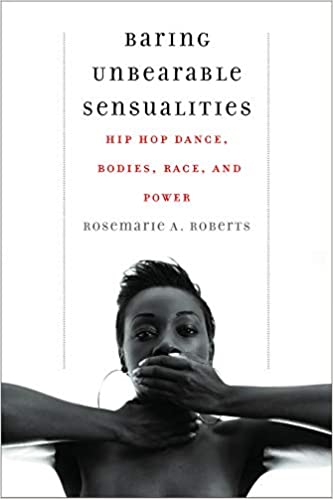Rosemarie A. Roberts - Baring Unbearable Sensualities: Hip Hop Dance, Bodies, Race, and Power
Written by Chi Chi Thalken on February 17, 2022Rosemarie A. Roberts is Dayton Professor of Dance at Connecticut College, where she teaches courses in Afro-Caribbean dance techniques and traditions, dance pedagogy and dance history. She has taught workshops for people of all ages, directed programs and performed to diverse audiences at a variety of venues in the Caribbean and the United States including Yale University, Mount Holyoke College and Howard University. At the School at Jacob’s Pillow, she has taught Afro-Cuban dance. She has taken a lot of that experience and research and put them into her new book, Baring Unbearable Sensualities: Hip Hop Dance, Bodies, Race, and Power.
Drawing upon her own research and experience as an instructor, especially during her time teaching workshops at Jacob’s Pillow, as well as tapping the expertise of dancers, choreographers, and instructors such as Ynot, Mr. Wiggles, Marjory Smith, and Rennie Harris, Professor Roberts is seeking to make some deep connections across the course of this book. She’s not just isolating specific steps to study, and she’s not just looking at specific time periods or locations to break down specific movements within hip hop dance. Instead, Roberts seeking to connect everything about hip hop dance and find the greater historical, philosophical, and sociological significance of the art form. Where do certain moves come from, and what do they communicate? What makes someone an authentic dancer, one whose moves resonate emotionally with their audience? How are different techniques passed down, and what is the significance of those techniques? If these sound like deep and heady questions, that’s because they are, and as a result this book isn’t necessarily for the lay reader. The first chapter in particular is a bit dry as Roberts lays down the groundwork and gives you the definitions and reference points you’ll need to understand the rest of the book, but if you stick with it, the rest of the book will open up to you. Roberts moves between the highly analytical and moments of personal narrative, allowing the reader to connect the dots between the two, seeing how theory is put into practice in the space of the dance workshops taught by herself and others. As a result, you’re taken on a really intense journey to deeper understanding of the layers of hip hop dance, and where it fits into the larger sociological and historical contexts of dance, race, and power.
Baring Unbearable Sensualities is s short book, but it is a dense and impactful read. Roberts does a lot of work within that space to bring readers up to speed and to get them thinking about hip hop dance not just as a fun or isolated thing, but something that is packed full of meaning that connects to larger historical and sociological factors of race and power.
| Title: | Rosemarie A. Roberts - Baring Unbearable Sensualities: Hip Hop Dance, Bodies, Race, and Power |
|---|---|
| Label: | Wesleyan University Press |
| Year: | 2021 |
| Rating: | 8/10 |

